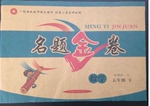题目内容
One day a famous speaker gave a speech to a crowd of people. He held up a 21 bill. He asked, “Who would like this $20 bill ? ” Hands were 22 . Then he said, “I am going to give this $20 to one of you, but first let me do this.” He began to crumple(弄皱)the 23 . He then asked the audience, “ 24 still wants it ?” Still the hands went 25 in the air.
“ What 26 I do this? ” He asked, and he 27 it on the ground, and started to step on it. He 28 it up. Now the bill was 29 and crumpled. “ Now who still wants it?” Still the hands went up.
“My friends,” He continued, “You have all 30 a good lesson . No matter 31 I did to the money, you still wanted it because the bill did not lose its 32 . It was still worth $20. Many times in our 33 , we are dropped, crumpled, and stepped on, because we sometimes 34 wrong decisions, or we may 35 with something we do not 36 .When that happens, we feel depressed and think we are 37 . But in fact no matter what has happened or what will happen, you will never lose your value. The worth of our life comes not 38 what we do or whom we know, but in who we are! Don’t forget ‘the worth of a thing does not depend on its outside 39 , but on its inner value.’ This is the 40 of life.
| 【小题1】 |
|
| 【小题2】 |
|
| 【小题3】 |
|
| 【小题4】 |
|
| 【小题5】 |
|
| 【小题6】 |
|
| 【小题7】 |
|
| 【小题8】 |
|
| 【小题9】 |
|
| 【小题10】 |
|
| 【小题11】 |
|
| 【小题12】 |
|
| 【小题13】 |
|
| 【小题14】 |
|
| 【小题15】 |
|
| 【小题16】 |
|
| 【小题17】 |
|
| 【小题18】 |
|
| 【小题19】 |
|
| 【小题20】 |
|
【小题1】D
【小题2】C
【小题3】A
【小题4】C
【小题5】A
【小题6】C
【小题7】B
【小题8】D
【小题9】D
【小题10】B
【小题11】C
【小题12】A
【小题13】D
【小题14】B
【小题15】A
【小题16】D
【小题17】A
【小题18】B
【小题19】C
【小题20】B
解析试题分析:
【小题1】D根据句子结构此处应填一个形容词,a 20-dollar bill一张20美元的支票。20-dollar是复合形容词,不加s. 如:an eight-year-old girl一个八岁的小女孩。
【小题2】C从上文的held up及下文的Still the hands went up可知,“举着手”,若选B或D要加up,答案A是不及物动词,应排除。
【小题3】A从上下文可知,他开始弄皱了支票。
【小题4】C 此处是疑问句,排除A,B,D。.A.somebody用于肯定句,C.Anybody 用于否定句或疑问句。句意:还有人想要吗?
【小题5】A.根据下文Still the hands went up可知答案
【小题6】C.What if ....要是。。。又怎么样,如果。。。该怎么办。
【小题7】B从下文第三段第三句we are dropped可知是‘丢在地上开始踩’
【小题8】D pick up捡起来,结合上下文可知,丢在地上踩了之后捡起来。B.lift up 举起来
【小题9】D根据常识,支票丢在地上踩了之后,应该是“脏的”
【小题10】B. Learn a lesson 吸取一个教训,
【小题11】C根据语法结构,do 后面缺宾语,故用what ,no matter what无论什么。句意:无论我对这张钱做些什么,你们还是会要它。。。
【小题12】A联系上下文可知,支票没有失去它的价值。
【小题13】D从下文The worth of our life可知,作者从支票联系到实际,联系到我们的生活
【小题14】B固定短语,make decisions做决定
【小题15】A . meet with 遇到,遭遇到。
【小题16】D从下文feel depressed可知遇到我们没料到的的事情。Expect期望,料想
【小题17】A联系上下文,我们觉得沮丧,认为我们毫无价值。
【小题18】B联系上下文,注意not....but...这一并列结构,but后接介词in+从句,便可知答案
【小题19】C根据上文中提到即使那张支票被弄得又皱又脏,还是有它自身的价值。说明:一件东西的价值不在于外表而是内在的价值。
【小题20】B名词辨析。A教训B真相,事实C谚语,格言D故事,根据句意这是生活的本质。
考点:夹叙夹议类短文。本文通过讲述一位演讲者向听众展示一张支票,尽管这张支票被弄得又皱又脏,人们还是要它,因为它还是有它自身的价值。进而联系到人生的真谛:不在于外表而是内在的价值。
点评:答题前一定要读懂全文,弄清文章要表达的思想,注意前后段落之间的关系。答题中,一定要认真分析,注意选项与上下文的关系,与前后单词的关系。对于一时没有太大的把握的题可以放到最后再来完成,因为有时答案可以从下文内容体现出来。答完后再通读一篇文章,看看所选选项能不能是语句通顺,语意连贯。

 名题金卷系列答案
名题金卷系列答案I don’t want to talk about being a woman scientist again. There was a time in my life when people asked constantly for stories about what it’s like to work in a field dominated (controlled) by men. I was never very good at telling those stories because truthfully I never found them interesting. What I do find interesting is the origin of the universe, the shape of space, time and the nature of black holes.
At 19, when I began studying astrophysics(天体物理学), it did not bother me in the least to be the only woman in the classroom. But while earning my Ph.D. at MIT and then as a post-doctor doing space research, the issue started to bother me. My every achievement—jobs, research papers, awards—was viewed through the lens (镜片) of gender (性别) politics. So were my failures. Sometimes, when I was pushed into an argument on left brain versus (相对于) right brain, or nature versus nurture (培育), I would instantly fight fiercely on my behalf and all womankind.
Then one day a few years ago, out of my mouth came a sentence that would eventually become my reply to any and all provocations (挑衅) : I don’t talk about that anymore. It took me 10 years to get back the confidence I had at 19 and to realize that I didn’t want to deal with gender issues. Why should curing sexism be yet another terrible burden on every female scientist? After all, I don’t study sociology or political theory.
Today I research and teach at Barnard, a women’s college in New York City. Recently, someone asked me how many of the 45 students in my class were women. You cannot imagine my satisfaction at being able to answer, 45. I know some of my students worry how they will manage their scientific research and a desire for children. And I don’t dismiss those concerns. Still, I don’t tell them “war” stories. Instead, I have given them this: the visual of their physics professor heavily pregnant doing physics experiments. And in turn they have given me the image of 45 women driven by a love of science. And that’s a sight worth talking about.
【小题1】Why doesn’t the author want to talk about being a woman scientist again?
| A.She is fed up with the issue of gender discrimination (歧视). |
| B.She feels unhappy working in male-dominated fields. |
| C.She is not good at telling stories of the kind. |
| D.She finds space research more important. |
| A.the burden she bears in a male-dominated society |
| B.her involvement in gender politics |
| C.her over-confidence as a female astrophysicist |
| D.the very fact that she is a woman |
A. Lack of confidence in succeeding in space science.
B. Unfair accusations from both inside and outside her circle.
C. People’s fixed attitude toward female scientists.
D. Widespread misconceptions about nature and nurtured.
【小题4】What does the image the author presents to her students suggest?
| A.Women students needn’t have the concerns of her generation. |
| B.Women can balance a career in science and having a family. |
| C.Women have more barriers on their way to academic success. |
| D.Women now have fewer problems pursuing a science career. |